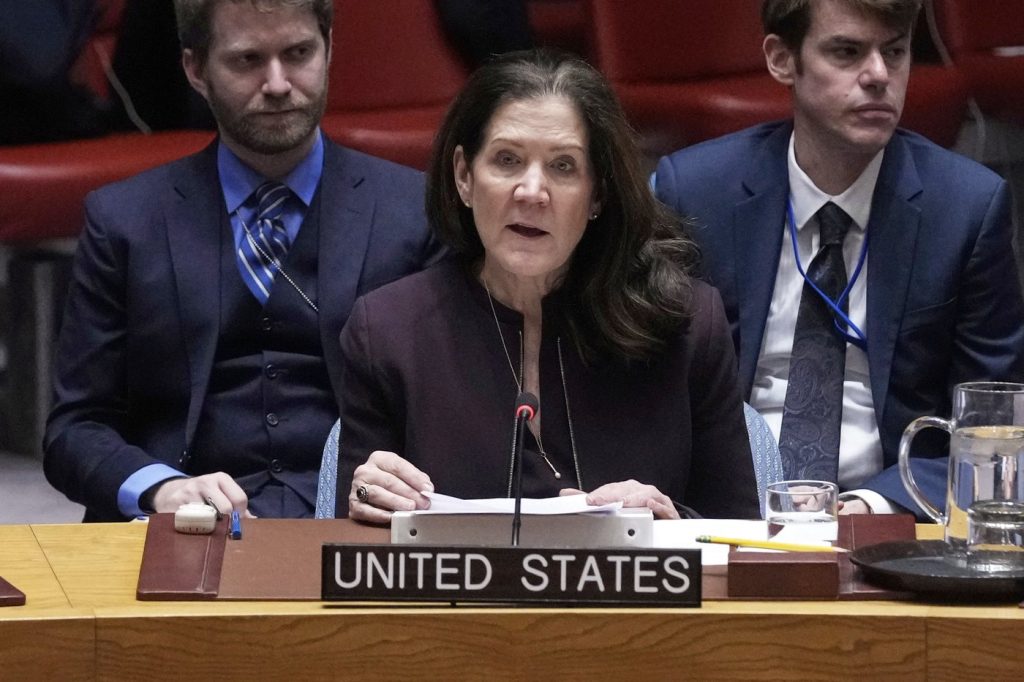UNITED NATIONS (AP) - The current highest-ranking U.S. representative at the United Nations, Dorothy Shea, remarked to Congress two years ago that Russia's invasion of Ukraine was "unprovoked" and "unjustified." She urged members of the U.N. to condemn Russia's aggression and called for an end to the ongoing war.
This past February, Shea reiterated her stance, speaking on behalf of the Trump administration when the U.S. chose to diverge from its European allies by not supporting a U.N. resolution that blamed Russia for its invasion on the third anniversary of the conflict. Despite typical expectations for diplomats to maintain their roles through changes in presidential administrations, Shea's interim position has unexpectedly positioned her as a prominent figure representing a significant shift in U.S. foreign policy.
Shea has continued in her role following former President Donald Trump's unusual choice last month to withdraw his nominee for U.N. ambassador, Representative Elise Stefanik. This decision stemmed from a slim Republican majority in the House, extending Shea's tenure longer than anticipated. Phillip Reeker, the former acting assistant secretary of state for Europe, noted the uniqueness of her position, emphasizing that the shift in U.S. policy, particularly regarding the U.N. vote on the Russia-Ukraine war, marks a critical turning point in international relations.
On February 24, the U.S. aligned itself with Russia in voting against a European-backed resolution that demanded the immediate withdrawal of Russian forces from Ukraine. In a competing U.S. proposal, while acknowledging the tragic loss of life, there was no explicit mention of Russia’s aggression, as the Trump administration initiated negotiations with Russia toward a ceasefire. Shea, addressing the situation, stated, "Continuing to engage in rhetorical rivalries in New York may make diplomats feel vindicated, but it will not save souls on the battlefield."
This change in stance sent shockwaves through the 193-member U.N. General Assembly, where resolutions, although not legally binding, are often seen as indicators of global sentiment. The U.S. vote raised concerns among allies about the implications of a potential second Trump presidency for established transatlantic partnerships and the U.S. role as a defender against aggressors like Russia. Throughout her distinguished 30-plus-year career, Shea has served under both Republican and Democratic administrations, embodying the diplomatic practice of advocating for a sitting president's policies, regardless of personal beliefs or long-standing U.S. positions.
Shea’s background includes significant diplomatic experiences, including her tenure in South Africa during Nelson Mandela's first election and her work on the Israeli-Palestinian peace process in Israel. Raised in the suburbs of Washington, D.C., with a father who served in World War II and a mother active in Japanese American community initiatives, Shea pursued international relations at the University of Virginia after being influenced by intercultural exchanges in her youth. She climbed the ranks to eventually serve as Ambassador to Lebanon, where she gained attention for her condemnation of Hezbollah.
In 2023, President Biden nominated Shea to be the Deputy U.S. Ambassador at the U.N. As for her future at the U.N., it remains uncertain when she will transition to a Senate-confirmed appointee. Stefanik's nomination was halted due to the significant role her vote plays in advancing Trump's agenda within the Republican Party, making her the fourth Trump nominee not to secure confirmation. There has been no indication from Trump regarding a new nominee to fill this crucial Cabinet position.
Currently, Shea is at the forefront during a pivotal period for U.S. foreign policy, tasked with adapting to new policies that significantly alter the dynamics of international relations. The White House has recently proposed substantial cuts to the State Department, suggesting the elimination of funding for nearly all international organizations, including the U.N. This preliminary proposal encapsulates the administration's isolationist approach, thereby presenting challenges for the U.N. and its mandate moving forward.










